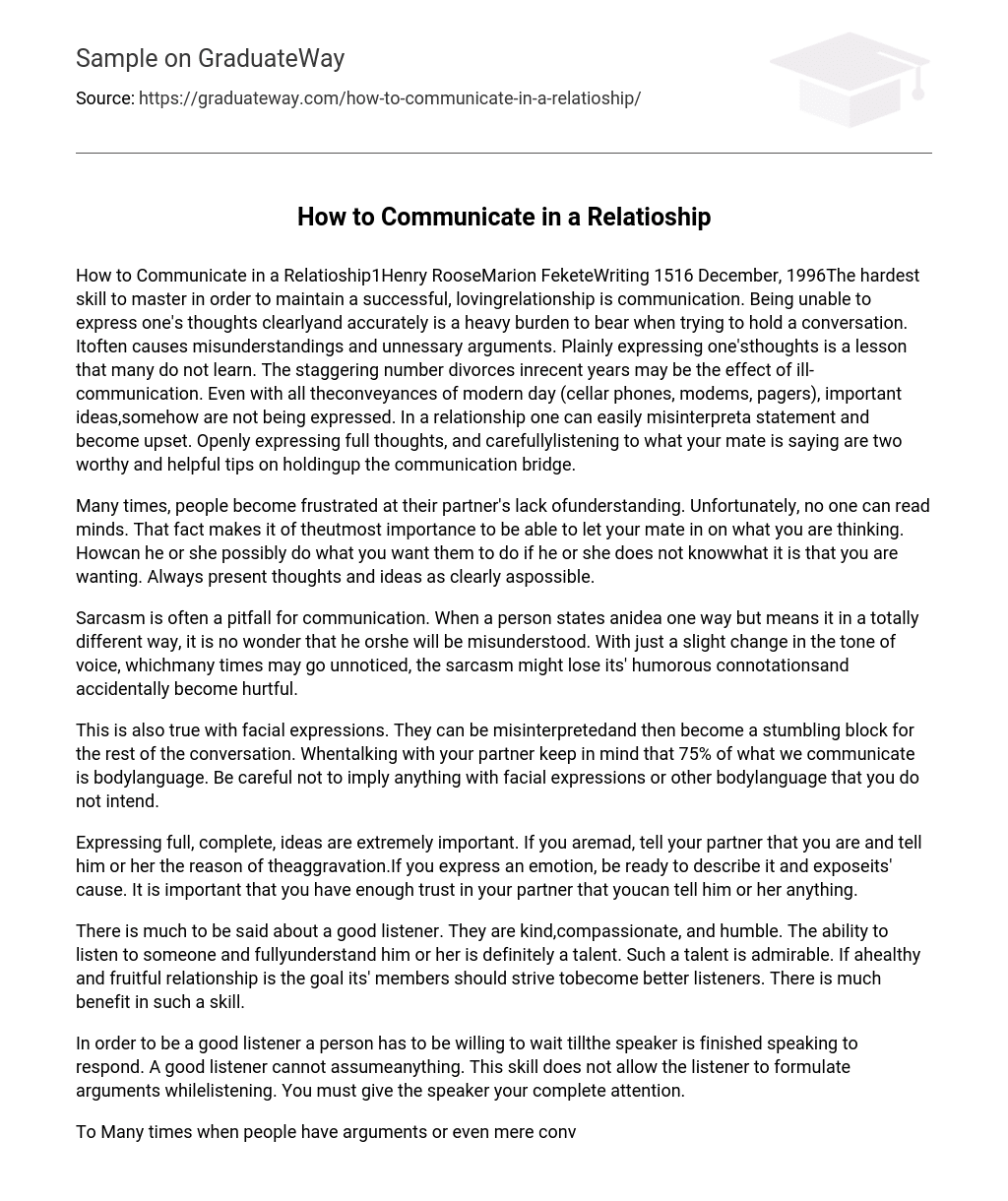How to Communicate in a Relatioship1Henry RooseMarion FeketeWriting 1516 December, 1996The hardest skill to master in order to maintain a successful, lovingrelationship is communication. Being unable to express one’s thoughts clearlyand accurately is a heavy burden to bear when trying to hold a conversation. Itoften causes misunderstandings and unnessary arguments. Plainly expressing one’sthoughts is a lesson that many do not learn. The staggering number divorces inrecent years may be the effect of ill-communication. Even with all theconveyances of modern day (cellar phones, modems, pagers), important ideas,somehow are not being expressed. In a relationship one can easily misinterpreta statement and become upset. Openly expressing full thoughts, and carefullylistening to what your mate is saying are two worthy and helpful tips on holdingup the communication bridge.
Many times, people become frustrated at their partner’s lack ofunderstanding. Unfortunately, no one can read minds. That fact makes it of theutmost importance to be able to let your mate in on what you are thinking. Howcan he or she possibly do what you want them to do if he or she does not knowwhat it is that you are wanting. Always present thoughts and ideas as clearly aspossible.
Sarcasm is often a pitfall for communication. When a person states anidea one way but means it in a totally different way, it is no wonder that he orshe will be misunderstood. With just a slight change in the tone of voice, whichmany times may go unnoticed, the sarcasm might lose its’ humorous connotationsand accidentally become hurtful. This is also true with facial expressions. They can be misinterpretedand then become a stumbling block for the rest of the conversation. Whentalking with your partner keep in mind that 75% of what we communicate is bodylanguage. Be careful not to imply anything with facial expressions or other bodylanguage that you do not intend.
Expressing full, complete, ideas are extremely important. If you aremad, tell your partner that you are and tell him or her the reason of theaggravation.If you express an emotion, be ready to describe it and exposeits’ cause. It is important that you have enough trust in your partner that youcan tell him or her anything.
There is much to be said about a good listener. They are kind,compassionate, and humble. The ability to listen to someone and fullyunderstand him or her is definitely a talent. Such a talent is admirable. If ahealthy and fruitful relationship is the goal its’ members should strive tobecome better listeners. There is much benefit in such a skill. In order to be a good listener a person has to be willing to wait tillthe speaker is finished speaking to respond. A good listener cannot assumeanything. This skill does not allow the listener to formulate arguments whilelistening. You must give the speaker your complete attention.
To Many times when people have arguments or even mere conversations theyconstantly interrupt each other. This makes it difficult to present completeideas. When someone interrupts you with a statement you will probably respond tothat statement because it has deterred your focus to a different point. When yourespond to the other person’s interrupting statement, it makes it much harderfor that person to understand what it is that you are trying to say. You losethe chance to explain yourself completely when you are interrupted and thereforeinterruption becomes a break in the bridge of communication.
Remember the saying, Assumption makes an ass out of you and me? Thatphrase is particularly true when it applied to communicating. Many times alistener will listen between the lines and misinterpret the speaker. Assuminga speaker’s subject or purpose causes a collapse in communication that ispainstakingly hard to correct, taking valuable tine and energy. Formulating arguments and/or responses to a speaker’s statementsrequires time. The time, however should not be the time during which yourpartner is speaking. Your partner deserves your complete attention. If you waitto hear the speaker’s full thought and can more accurately respond to him or her.
To successfully uphold the bridge of communication in a relationship,partners most both be willing to become better at expressing themselvescompletely and thoroughly, and to try harder at becoming abetter listener. This will take time and practice, but with persistence theskills will develop. Communication is the key in relationships. Whether therelationship will be a success or a total disaster depends heavily on thepartners’ communication skills.
I have presented a number of valuable tools that can drastically helpcommunication in a relationship. I have laid out specific instructions on how tolisten and how to express yourself in ways that do not confuse you or yourpartner. Please heed my advice and uphold the priceless bridge of communication.





